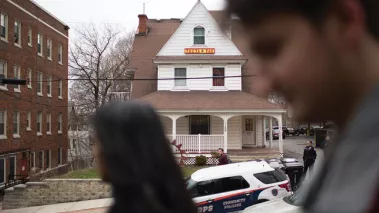Table of Contents
New York court upholds Syracuse Theta Tau students’ punishment despite finding their speech was protected

A New York court denied the Syracuse University Theta Tau students’ petition to overturn their suspension, holding that SU can punish the students for their private, satirical skit even though their expression is protected under First Amendment standards. The flawed decision is a setback for the students who sought to hold SU accountable for breaking its promise to protect students’ free speech rights.
The lawsuit was filed by former members of the Theta Tau fraternity chapter suspended in June 2018 by SU after their private, satirical roast was revealed and publicized by the student newspaper, resulting in campus outrage over derogatory language used in the skits. The suspended students argued that SU’s explicit, written policies promising free speech constitute a binding legal contract preventing the school from violating its students’ expressive rights. Their contentions echoed FIRE’s two letters to the university, which explained how private universities like SU, while not bound by the First Amendment, are bound by the free speech promises they make to their students.
In a contradictory Jan. 8 ruling, the Jefferson County Supreme Court acknowledged that the students’ speech falls within SU’s protections for free speech, but still upheld the university’s punishment. The court first addressed the students’ violation of SU’s harassment policy, finding that the policy “clearly exempts protected free speech.” The court concluded that since the videos “are protected free speech, . . . the violation of this [student code of conduct] section is not founded upon a rational basis and will not be sustained.”
The court then turned to the students’ punishment for conduct that “threatens the mental health [of others].” SU asked the court to uphold its determination that, by recording the private satirical skit, the students threatened members of the campus community who felt unsafe as they watched the video three weeks later when it was leaked. The court first criticized SU’s characterization of the charge, explaining that it “can envision students having the same reaction of feeling ‘unsafe’ after a debate on abortion, a debate on the support of Israel, or a debate on the confirmation of Justice Kavanaugh; issues upon which one would think an institution of higher education would encourage debate.”
Yet despite the serious free speech issues with punishing students for recording a video, SU’s stated commitments to upholding freedom of speech, and the court’s ruling that the videos were, in fact, protected expression, the court inexplicably upheld the university’s decision, concluding that the suspensions overall were “rational” and “clearly within the [university’s] guidelines.”
FIRE is disappointed that this court refused to apply one of the most basic principles of our legal system: Institutions must generally adhere to the promises they make, especially the clear, written policies advertised by a university in its student code of conduct and similar policy materials. Just as a college cannot take a student’s tuition and then refuse to provide any sort of education, SU may not purport to uphold its students’ expressive rights and then suspend them for speech protected under First Amendment standards.
FIRE has called out this hypocrisy again and again at SU, a university that has the words of the First Amendment emblazoned on its school of communications, yet continually displays a disturbing disregard for freedom of speech. From SU’s expulsion of an education student for his Facebook post to its investigation of a law student over his satirical blog, the university has made it clear that its stated commitment to student rights is worthless.
This court ruling will only encourage private schools like SU to create, advertise, and then refuse to enforce illusory promises of free speech. Based on the logic of this ruling, students at private colleges can be expelled for flaunting universities rules, but these colleges should fear no consequences for defaulting on their obligations. SU students should know that their expressive freedoms are determined not by university policy, but by the arbitrary whims of university administrators, who may defy student's rights with impunity.
The students have filed a notice of appeal and seek to overturn this erroneous decision. FIRE will watch the litigation closely and will keep our readers updated.
Recent Articles
Get the latest free speech news and analysis from FIRE.

Can the government ban controversial public holiday displays?

The trouble with banning Fizz

FIRE's 2025 impact in court, on campus, and in our culture
